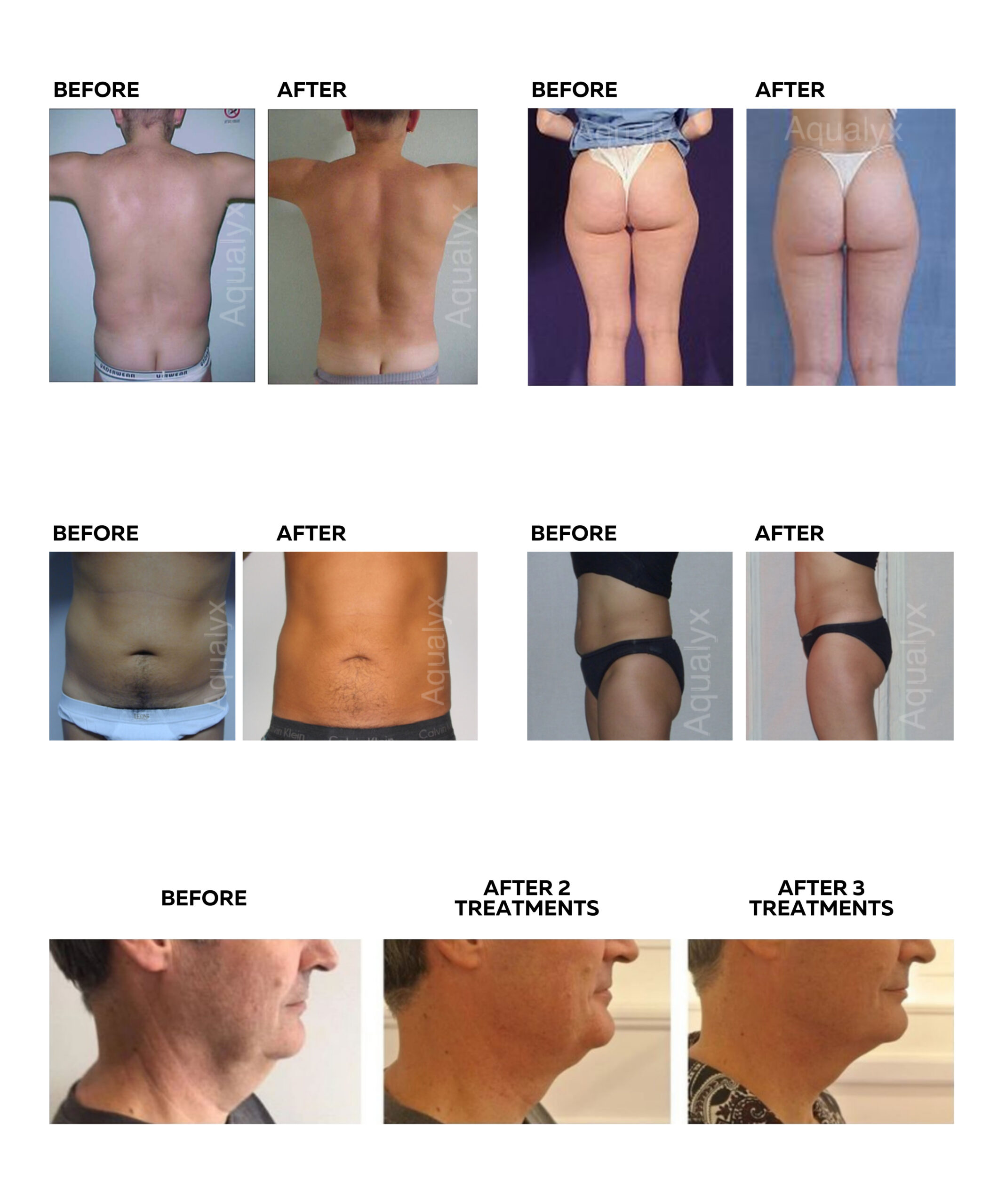Jump To Section
If you’re seeking a non-surgical solution to stubborn fat, you might be asking: Do fat dissolving injections work? The answer is a resounding yes, especially for those who are looking to sculpt specific areas of their body. In this blog, we’ll dive into how fat dissolving injections work, who is and isn’t an ideal candidate, and how you can maximise and maintain your results to make the most of this innovative treatment.
What Are Fat Dissolving Injections?
Fat dissolving injections, such as Aqualyx, offer a highly effective and minimally invasive way to target and break down fat in areas like the chin, abdomen, and thighs. These fat cells are then naturally eliminated by your body, helping you achieve a more contoured appearance. For more detailed information, take a look at our Ultimate Guide to Fat Dissolving Injections.

How Do Fat Dissolving Injections Work?
Fat dissolving injections break down fat cells over time, allowing your body to process and remove them naturally. The treatment works best with a series of sessions, progressively giving you more refined results. For a comprehensive look at how the process works, check out our Ultimate Guide.
Are Fat Dissolving Injections Effective?
Yes, fat dissolving injections are highly effective when used for the right candidates. The treatment shines when applied to smaller, stubborn pockets of fat that haven’t responded to diet and exercise. Unlike surgical fat removal options, this non-invasive treatment allows you to target specific areas while enjoying a smoother recovery and fewer risks.
For the best outcome, it’s important to follow the recommended course of treatments. This way, the effects build over time, offering visible and long-lasting results. Additionally, when paired with a healthy lifestyle, the results can be even more transformative, allowing you to enhance and maintain your new contoured look.
Who Are Fat Dissolving Injections Suitable For?
Fat dissolving injections are perfect for people who are close to their ideal weight but have small, localised areas of fat that are resistant to traditional methods. Common treatment areas include:
- Double chin reduction
- Abdomen contouring
- Love handle refinement
- Thigh sculpting
These injections work best when combined with a balanced diet and regular exercise, making them an excellent complement to your overall healthy lifestyle.
When Fat Dissolving Injections May Not Be Effective
While fat dissolving injections offer fantastic results for many, they are not suitable for everyone. Those with active infections, autoimmune diseases, or those who are pregnant or breastfeeding should avoid the treatment. It’s always advisable to consult with a medical professional to ensure this is the right option for you.
Additionally, there are cases where fat dissolving injections may not deliver the expected results:
- People with larger fat deposits: If you’re looking to reduce significant amounts of fat, fat dissolving injections may not be the best option. Surgical procedures like liposuction might be more effective for those seeking larger-scale fat reduction.
- Individuals expecting immediate results: Many people believe that results will be visible after just one session. While there may be some slight improvement, true results are gradual and appear after completing a full course of treatments.
- Those who are unwilling to maintain a healthy lifestyle: Fat dissolving injections work best when combined with a healthy lifestyle, including a balanced diet and regular physical activity. Without this, the treatment’s effectiveness can be diminished.

Are Fat Dissolving Injections Safe?
Yes, when administered by qualified professionals, fat dissolving injections like Aqualyx are considered safe. At Freyja Medical, patient safety is our top priority. It’s essential to consult a practitioner to ensure this treatment is right for you. Click here for more on the safety of fat dissolving injections.
Alternatives to Fat Dissolving Injections
If fat dissolving injections aren’t suitable for you, other options may offer better results:
- CoolSculpting (Cryolipolysis): This treatment freezes fat cells, allowing them to be naturally eliminated by the body. It’s another option for those with small pockets of stubborn fat.
- Liposuction: For larger fat reductions or more dramatic results, surgical liposuction may be the best option.
- Diet and exercise: In some cases, a more structured approach to diet and exercise may be all that’s needed to address stubborn fat areas, without any medical intervention.

What Results Can You Expect?
Results from fat dissolving injections are most effective when patients commit to the full course of treatments and maintain a healthy lifestyle. While you may notice subtle changes after the first session, more significant results typically appear after several weeks to months.
Once the fat cells are broken down, they will not regenerate, but that doesn’t mean fat can’t accumulate elsewhere. This is why it’s essential to continue eating well and exercising regularly to sustain your results.

Final Thoughts
So, do fat dissolving injections work? Yes, when used correctly and for the right candidates, fat dissolving injections can effectively reduce small, stubborn pockets of fat. However, it’s important to remember that the treatment works best when combined with a healthy lifestyle, including a balanced diet and regular exercise. This will not only maximise the results but also help maintain them long-term.
How to Book Your Consultation
If you’re interested in Aqualyx fat-dissolving injections and want to learn more, book a consultation with our aesthetic specialist doctors or nurses at Freyja Medical! Click here to book online or contact us directly at 01978799688 or email us at [email protected]. Our expert team is here to guide you towards the best treatment options tailored to your needs and goals.


